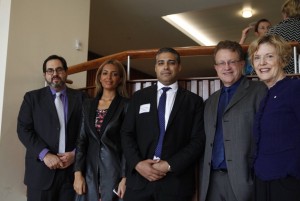Welcoming Mohamed Fahmy to UBC
On October 21, UBC got to welcome and to pay tribute to an extraordinary Canadian, journalists Mohamed Famhy, who was recently released from prison in Egypt. Imprisoned largely for reporting on Egyptian politics for Al Jazeera, Fahmy is now at UBC as a Visiting Professor in the School of Journalism, sponsored by the Global Reporting Centre and by the W. Maurice Young Centre for Applied Ethics. My remarks below are from that ceremony at the Peter Wall Institute for Advanced Studies.

From left to right, Professor Peter Klein, Fahmy’s wife Marwa Omara, Mohamed Fahmy, me and President Martha Piper.
I want to thank President Piper for addressing in her remarks the central importance of academic freedom within universities, something I’m certain that everyone in this university holds dear. But academic freedom is a limited and more specific variant—local to the academy—of a broader principle: the right to free expression. Of course, free expression is rarely an absolute. In Canada we limit free speech by prohibiting hate speech, libelous expression and plagiarism. Academic freedom is intended to ensure that researchers can freely publish their research without interference, and the right to free expression exists so that journalists can report on the unfolding of history without censorship from the nation states within which they report and that artists can express deeply held views in controversial, provocative or evenly disturbing works of art without fear for their person or freedom.
We know that such rights and principles are precarious or non-existent throughout much of the world—we know that journalism, for example, is a very dangerous profession (President Piper just spoke of the 66 journalists who lost their lives last year as a result of their work), we know that that artists and intellectuals sit in jail cells around the world, and we know that activists too often meet with brutal ends, and scholars too may find themselves unable to secure funding if their research conflicts with entrenched interests. Today, we come together firstly to welcome and to celebrate a new member of our community, Professor Mohamed Fahmy, but we are also celebrating and recommitting ourselves to the principles of freedom of expression and of academic freedom.
I am fortunate to be allowed to lead a Faculty devoted to the study and nurturing of the “human” and the “social”, and so our researchers, instructors and students are steeped in the issues on which Mr. Fahmy reported from the Egypt Bureau of Al Jazeera during a period of revolutionary social transformations, political change, and ideological and spiritual challenge. He was in a very right place and time for capturing these extraordinary events, but unfortunately in the wrong place when the repressive Egyptian military government went looking for scapegoats. I doubt that there are many students here (and certainly no faculty) who have not followed his wrongful imprisonment and re-imprisonment, kangaroo trials, and subsequent release with a mix of fascination at the events unfolding, sorrow at the human cost and the deprivation of liberty, and admiration for the way that Mr. Fahmy and his family have comported themselves and dealt with the circumstances of his imprisonment.
I’m delighted that there’s been such interest in Professor Fahmy’s residency: departments such as Political Science; Geography; Sociology; Classical, Near Eastern, and Religious Studies; Theatre/Film; Creative Writing; the Liu Institute for Global Issues– have all expressed interest in having Professor Fahmy as a guest lecturer – so I’m confident that we can make one absolute commitment to him: that we will keep him exceedingly busy while he’s here at UBC!
Mohamed Fahmy’s visit fits well with the interest stirring across the campus in the initiative to build a policy school around the new MPPGA program, with its links to the School of Journalism and its Global Reporting Centre. I’d like to give special thanks to Dr. Alfred Hermida, Director of the School, who, along with Peter Klein, has been outspoken about Mr. Fahmy’s plight, and has contributed School funds to support this visit.
It’s rare for me to quote scripture, but some of you may know the quote in Luke that says: “From everyone who has been given much, much will be demanded”. We find this notion woven in Western moral economy of social status in the West as the concept of “noblesse oblige”, meaning to be born into nobility obligates the individual to do service in the world. Another memorable variant is found in—of all places—the early Spider Man comics when Uncle Ben tells Peter Parker: “With great power comes great responsibility.”
But I’ll offer up a variant on this aphorism: it is sometimes the individuals from whom much has been taken, who respond by giving so much. We all know of those who have suffered deeply, and yet who have turned their suffering into grounds for social, moral, and political action. It is humbling when people in that position step forward as Mohammed Fahmy is doing in the wake of his release, and we thank him and his family for focusing their attention – and all of our – attention on the continued precarity of journalism in zones of conflict and in areas of the world characterized by totalitarian rule.
Universities enjoy significant privilege: public funding, prestige, tenure—and, yes, academic freedom. We have been given much, and much is demanded of us. I’m deeply grateful to everyone who has worked on bringing Mohamed Fahmy to UBC – you have helped us live up to the obligation of the university to stand up for freedom of expression.